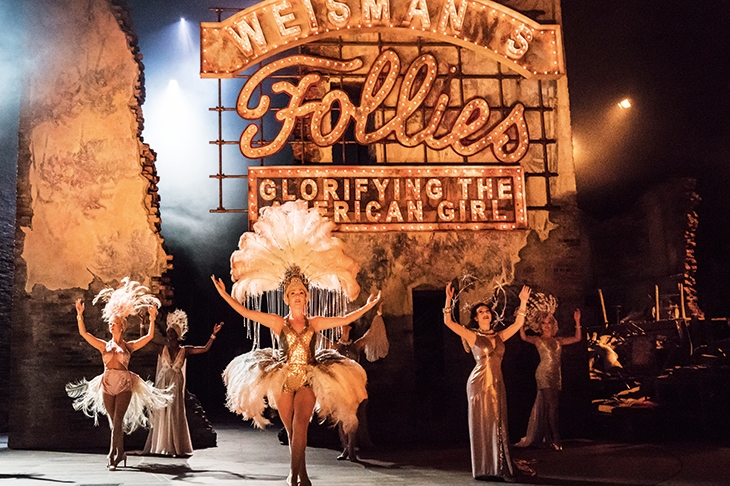Stephen Sondheim’s Follies takes a huge leap into the past. It’s 1971 and we meet two middle-aged couples who knew each other three decades earlier at a New York music hall. The building faces demolition and the owner is throwing a party for his old dancing-girls.
Dominic Cooke’s lavish production of this vintage musical boasts 58 performers, 160 costumes and 200 production staff. Yet it’s a curiously small show that could be performed, with a few cuts, in a pub theatre. There are four main characters and a smattering of cameos. Phyllis and Ben are rich New York grandees, unhappily married. Their chums Bud and Sally are also wealthy and disappointed with life. During the war, Phyllis and Sally were Broadway hoofers, and they meet up with their former colleagues to share old memories and present frustrations.
Janie Dee (Phyllis) is a sophisticated temptress with a wicked tongue and an air of moody bitterness. By some distance, she’s the best asset here. Her husband Ben is a flabby sex pest who prefers ogling young waitresses to romancing his still-gorgeous wife. His chum Bud (Peter Forbes) is a greasy muddle. Bud keeps a 29-year-old mistress on the go and yet he professes undying love for his sixty-something spouse, Sally. OK. But why cheat on her? Sally, meanwhile, wants to rekindle an extinguished affair with Ben, but she’s unaware that he prefers teenage serving girls. When Phyllis catches the eye of a hot young barman they have a quick knee-trembler on the theatre’s cramped and rotting seats. Not very edifying. And it’s hard to care about these geriatric bed-hoppers who are desperate for one last fling before they get shunted into the care-home for ever.
Cooke’s production spends too much time warming up. The theme is dancing- girls and yet it takes an hour before the first dance arrives. And it’s performed by seven ladies whose combined age, and I’m not joking, is over 400. They totter about on their creaking pins for a few minutes before withdrawing, on doctor’s orders no doubt, to let a younger, sexier troupe take over. What a relief. Then we get a couple of show-stopping tunes, ‘Broadway Baby’ and ‘I’m Still Here’. These are done brilliantly, but they’re not performed by the main characters. Both are incidental numbers assigned to cameo players. This unbalances the script. A show’s highlights should involve its stars and not its supporting cast. And although Sondheim is fabled for the dexterity of his lyrics his work doesn’t always bear scrutiny. ‘The Story of Lucy and Jessie’ introduces us to two chorus girls whose names have been selected, one assumes, for their rhyming potential. Lucy is ‘juicy’, and Jessie is ‘dressy’. Next, Lucy is ‘lacy’ and Jessie is ‘racy’, and their story is ‘very messy’. Fine, but hardly world-class. Then Sondheim’s ingenuity falters and he tells us that Jessie is ‘classy’ and ‘wants to be Lassie’. Am I missing something? Would a Broadway starlet really desire to be a celebrity sheepdog?
The show’s final half-hour consists of stand-alone numbers performed by the leading characters. The costumes are great, especially the chorus girls’ foldaway butterfly wings, and the songs are executed superbly. But the narrative simply vanishes. It may make sense to give Phyllis and Sally solo numbers because they’re professional singers. But why do Ben and Bud, a couple of bean counters, become crooners all of a sudden? This long finale might have been placed elsewhere without impairing the integrity of the whole. It feels like a separate show bolted on at the end to give the stars a reason to turn up each night. That said, I can still recommend this sugary piece of escapism. If you have an elderly relative to entertain, it’s ideal.
Ishq is a Pakistani tale of two star-crossed lovers. This version, popularised by the Sufi poet Waris Shah, has the simplistic outline of a panto. Princess Heer is seduced by the music of Ranjha, a handsome but homeless flautist. Their affair incenses a nasty old git called Kaido who has a limp, a knobbly stick and, one assumes, a long history of sexual disappointment. Yet he claims no responsibility for his campaign of hate. ‘I am the product of elements beyond my control,’ he wheedles, as he plots to wreck the lovers’ happiness. Technically, the show is very proficient. The costumes are terrific, the dances are thrilling to watch and the drumming is so accomplished that it might work as an attraction in its own right.
The show is part-sponsored by Pakistan’s high commission and it offers a glimpse of a cohesive and egalitarian society under a benign form of Islam. In the closing scene, a powerful woman dispenses justice to all. If that’s the future of Pakistan, good. But this story, alas, is set centuries ago.







Comments